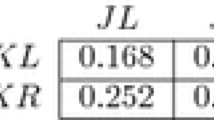Abstract
An autonomous correlation device in a multistage game is a device that, before every stage, chooses for each player a private signal, possibly in a correlated way, and reveals to each player the signal chosen for him. The chosen signals depend only on previous signals, and not on the actions of the players. An extensive-form correlated \(\varepsilon \)-equilibrium in a multistage game is an \(\varepsilon \)-equilibrium in an extended game that includes an autonomous correlation device. In this paper we prove that every stochastic game with Borel measurable bounded payoffs has an extensive-form correlated \(\varepsilon \)-equilibrium, for every \(\varepsilon >0\).
Similar content being viewed by others
Notes
A Blackwell game is a two-player zero-sum game that is played for infinitely many stages. At each stage the players simultaneously make their moves and are then informed of each other’s moves. Payoff is determined by a Borel measurable function on the set of possible resulting sequences of moves.
One could assume that play goes on without any further influence on the payoffs, so as to make the horizon infinite.
If \(|I|>2\), the players may use a correlated profile to punish a deviator. In this case, the device is also used to implement the punishment phase.
Throughout the paper, we use the notation \(g^i_h\) also for the expected payoff of player \(i\) under a mixed or a correlated profile.
References
Aumann RJ (1974) Subjectivity and correlation in randomized strategies. J Math Econ 1:67–96
Aumann RJ (1987) Correlated equilibrium as an expression of Bayesian rationality. Econometrica 55:1–18
Blackwell D (1969) Infinite \(G_\delta \) games with imperfect information. Zastosowania Matematyki (Appl Math) 10:99–101
Blackwell D, Ferguson TS (1968) The big match. Ann Math Stat 39:159–163
Flesch J, Kuipers J, Mashiah-Yaakovi A, Schoenmakers G, Shmaya E, Solan E, Vrieze K (2014) Non-existence of subgame-perfect \(ep\)-equilibrium in perfect-information games with infinite horizon. Int J Game Theory doi:10.1007/s00182-014-0412-3
Forges F (1986) An approach to communication equilibria. Econometrica 54:1375–1385
Forges F (1988) Communication equilibria in repeated games with incomplete information. Math Oper Res 13:77–117
Hart S, Schmeidler D (1989) Existence of correlated equilibria. Math Oper Res 14:18–25
Maitra A, Sudderth W (1998) Finitely additive stochastic games with borel measurable payoffs. Int J Game Theory 27:257–267
Martin DA (1975) Borel determinacy. Ann Math 2:363–370
Martin DA (1998) The determinacy of Blackwell games. J Symb Logic 63(4):1565–1581
Mertens J-F (1987) Repeated games. In: Proceedings of the International Congress of Mathematicians, 0, (Berkeley, California, 986), pp 0528–0577, American Mathical Society, Providence
Mertens J-F (1994) Correlated and communication equilibria. In: Mertens JF, Sorin S (eds) Game theoretic methods in general equilibrium analysis. Kluwer Academic, Dordrecht
Myerson RB (1986) Multistage games with communication. Econometrica 54:323–358
Nowak AS, Raghavan TES (1992) Existence of stationary correlated equilibria with symmetric information for discounted stochastic games. Math Oper Res 17:519–526
Solan E (1999) Three-player absorbing games. Math Oper Res 24:669–698
Solan E (2001) Characterization of correlated equilibria in stochastic games. Int J Game Theory 30:259–277
Solan E, Vieille N (2001) Quitting games. Math Oper Res 26:265–285
Solan E, Vieille N (2002) Correlated equilibrium in Stochastic games. Games Econ Behav 38:362–399
Vieille N (2000a) Equilibrium in 2-person Stochastic games. I. A reduction. Israel J Math 119:55–91
Vieille N (2000b) Equilibrium in 2-person Stochastic games. II. The case of recursive games. Israel J Math 119:93–126
Acknowledgments
The research leading to these results has received funding from the European Research Council under the European Community’s Seventh Framework Programme (FP7/2007–2013)/ ERC Grant agreement no [249159]. I would like to thank Sergiu Hart and Eilon Solan for insightful discussions and many useful comments.
Author information
Authors and Affiliations
Corresponding author
Rights and permissions
About this article
Cite this article
Mashiah-Yaakovi, A. Correlated Equilibria in Stochastic Games with Borel Measurable Payoffs. Dyn Games Appl 5, 120–135 (2015). https://doi.org/10.1007/s13235-014-0122-2
Published:
Issue Date:
DOI: https://doi.org/10.1007/s13235-014-0122-2




